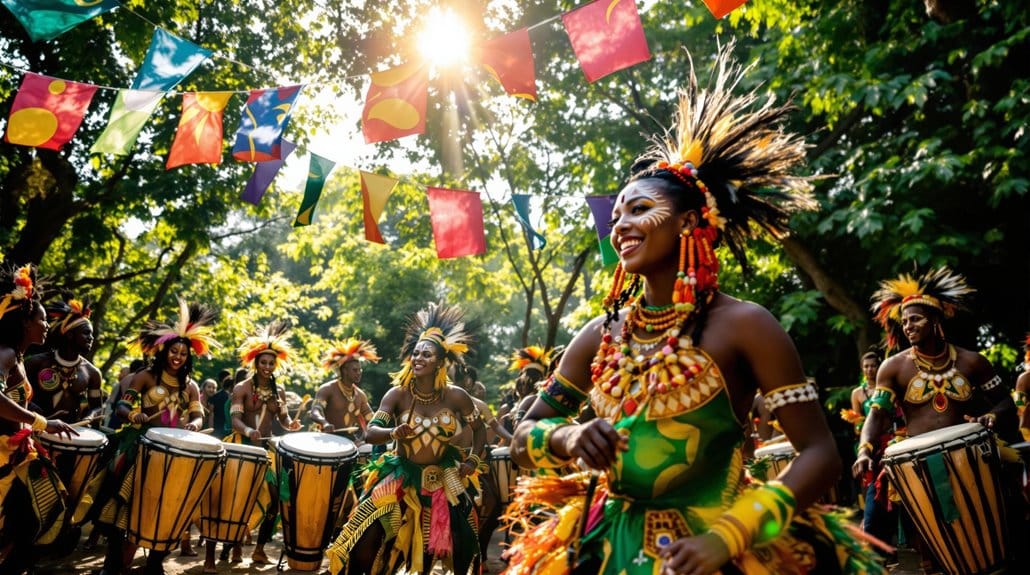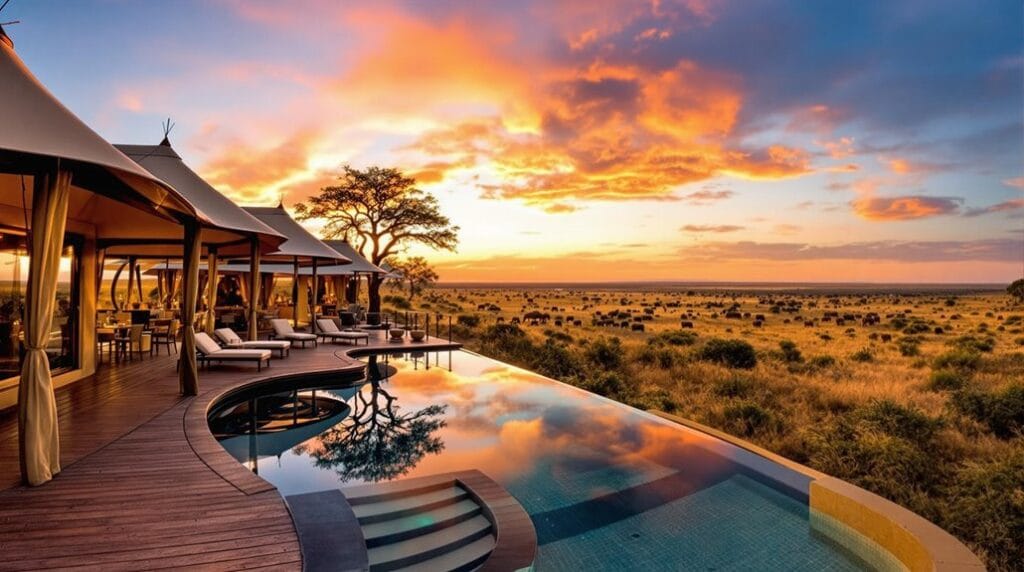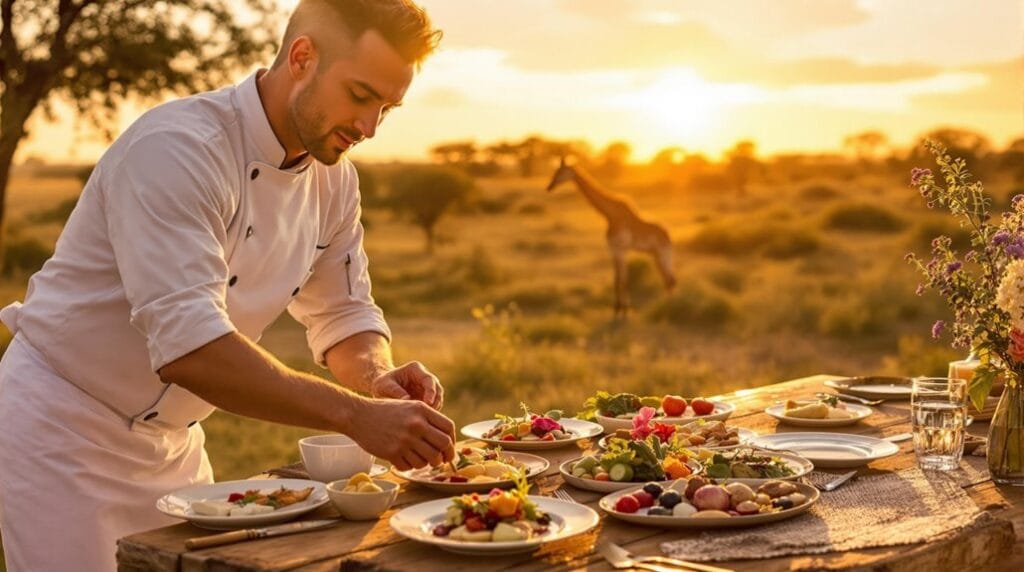Imagine witnessing the vibrant Bianou Festival in Niger, where the Tuareg people come alive through music, dance, and colorful attire. Each festival across Africa tells a unique story, reflecting the rich heritage and traditions of its people. For instance, the Gerewol Festival in Chad not only showcases beauty but also strengthens community bonds. As you explore these celebrations, you'll find that each event serves a deeper purpose, connecting participants to their history and identity. What might these festivals reveal about the cultures they represent?
Key Takeaways
- The Bianou Festival in Niger showcases Tuareg cultural pride with vibrant attire and a grand procession to the sultan's enclosure.
- The Gerewol Festival in Chad features beauty competitions where young men are judged by women, promoting community unity and pride.
- The Ouidah Voodoo Festival in Benin celebrates traditional Voodoo practices with parades, music, and rituals emphasizing ancestral connections.
- Timket in Ethiopia honors the baptism of Jesus through vibrant processions, mass baptisms, and community feasting, uniting diverse ethnic groups.
- The Zangbeto Festival in Togo involves cleansing rituals and performances that highlight Ewe cultural heritage, attracting both locals and tourists.
Bianou Festival in Niger
As you step into the vibrant world of the Bianou Festival in Niger, you can't help but feel the palpable energy that ignites the Tuareg community. The air buzzes with anticipation, as preparations have been underway for 23 days, transforming the landscape with colorful flags and decorations.
You're immediately drawn to the sight of men clad in indigo boubous, their turbans styled like roosters' combs—a striking display of traditional attire that symbolizes their deep cultural pride.
As the festival unfolds, the rhythms of music and the beats of dance invite you to join in, weaving a tapestry of unity among the Tuareg people. This grand celebration culminates in a procession to the sultan's enclosure, an act that embodies their shared heritage and resilience.
The Bianou Festival isn't just an event; it's a heartfelt expression of Tuareg traditions, where every song sung and every step danced reflects a rich cultural history that withstands the test of time.
You find yourself enveloped in a sense of belonging, feeling the warmth and camaraderie of a community that celebrates its identity with unyielding passion.
Gerewol Festival in Chad
The Gerewol Festival in Chad bursts forth with color and excitement, drawing you into the heart of the Wodaabe people's vibrant culture. This week-long celebration, held annually in late September, emphasizes beauty, love, and community through traditional rituals and performances.
During the festival, young men from the Wodaabe tribe showcase their attractiveness, adorned with intricate face paint and elaborate attire. Women, as judges, express their appreciation for these displays of beauty, fostering a sense of pride and unity among the tribe.
The highlight is the Yaake dance, performed under the sun, which reinforces cultural identity and social bonds within the Wodaabe community. As you immerse yourself in this lively atmosphere, you'll witness how the festival celebrates not just physical beauty but also the rich heritage of the Wodaabe.
| Feature | Description |
|---|---|
| Duration | Week-long event |
| Main Activities | Beauty competition, Yaake dance |
| Significance | Unity and cultural identity |
| Audience | Locals and tourists alike |
Experience the Gerewol Festival, and you'll find a world where cultural traditions and communal pride flourish beautifully.
Timket Celebration in Ethiopia
When you experience the Timket Festival in Ethiopia, you'll witness a breathtaking blend of spiritual significance and vibrant traditions.
As priests parade sacred tabots through the streets, the air fills with joyous music and the spirit of community engagement envelops you.
This annual celebration not only honors the baptism of Jesus but also unites thousands in a colorful tapestry of faith and cultural heritage.
Spiritual Significance of Timket
Celebrated during the vibrant month of January, Timket stands as a profound symbol of Ethiopia's rich Orthodox Christian heritage, marking the baptism of Jesus in the Jordan River. This traditional festival is deeply rooted in spiritual traditions that connect the community to their cultural heritage.
As you witness the priests carrying sacred tabots, replicas of the Ark of the Covenant, you can feel the palpable presence of God among the people, uniting them in faith and reverence.
The midnight reenactment of Jesus' baptism draws thousands to various bodies of water, where the spiritual cleansing ritual through blessed water offers a moment of renewal. Dressed in traditional white garments, participants embody purity and a fresh start, engaging in heartfelt prayers, hymns, and communal feasting.
This celebration transcends mere observation; it invites you to immerse yourself in a collective experience of devotion and joy.
Timket not only strengthens the bonds within the community but also invites individuals from all walks of life to embrace its rich spiritual and cultural significance.
It's a reminder that in celebrating one's heritage, you find belonging in something greater than yourself.
Colorful Processions and Rituals
Amidst the joyful atmosphere of Timket, vibrant processions pulse through the streets, drawing both locals and visitors into an enthralling display of faith and culture.
You can feel the energy as priests, clad in stunning ceremonial attire, carry sacred tabots that symbolize the Ark of the Covenant. This journey through the streets isn't just an event; it's a powerful reminder of spirituality and community.
The midnight reenactment of Jesus' baptism sets the stage for a mass baptism at dawn, where the water is believed to hold healing properties.
Attending this celebration, you'll see participants donning traditional white netela garments, singing, dancing, and feasting together.
- Experience the rich cultural heritage of Ethiopia.
- Witness the unity among diverse ethnic groups.
- Feel the deep spiritual connection fostered by shared rituals.
- Join in the communal joy of a festival that transcends borders.
As you immerse yourself in these colorful processions and traditional rituals, you'll find a sense of belonging within a community that celebrates both faith and identity.
This is more than a festival; it's a heartfelt embrace of heritage and togetherness.
Community Engagement and Unity
Engaging in the Timket Festival immerses you in a vibrant tapestry of community and unity that defines Ethiopian culture. This annual celebration, held in January, honors the baptism of Jesus, and it's a time when you can feel the pulse of collective spirit among participants.
As dawn breaks, the reenactment of the baptism unfolds, with locals believing in the spiritual cleansing power of the blessed water, reinforcing bonds and shared beliefs.
You'll witness colorful parades led by priests carrying sacred tabots, symbols of unity among the Ethiopian Orthodox Christian community. The weeks leading up to Timket are filled with anticipation, as families and neighbors come together to prepare, strengthening social ties and nurturing a sense of belonging.
The festival is a vibrant showcase of cultural traditions, with traditional music, dance, and attire all on display. Each element adds depth to the experience, enhancing community pride and preserving the rich tapestry of Ethiopian heritage.
Through active participation, you'll find that Timket isn't just a festival; it's a celebration of togetherness, echoing the essence of community engagement that resonates through the heart of African heritage.
Fire Dancing Ritual in Togo
When you witness the Fire Dancing Ritual in Togo, you can feel the spiritual energy crackling in the air, as dancers tread fearlessly across flames, embodying both resilience and cultural pride.
This vibrant display not only connects participants to their ancestors but also fosters a sense of unity among the community, celebrating their shared heritage.
As traditional music fills the atmosphere, you realize that this is more than just a performance; it's a powerful expression of identity and strength.
Spiritual Significance of Fire
Fire holds a profound spiritual significance in the Fire Dancing ritual of Togo, especially within Ewe villages. This mesmerizing dance isn't just about the flames; it embodies the community's spiritual beliefs and traditional religion. As you watch dancers walk and twirl on hot embers, you witness their unwavering faith and commitment to their ancestors. It's a powerful reminder of the bond between the living and those who've passed.
- The ritual serves as a cleansing practice, believed to dispel negative energies.
- It reinforces social bonds, as villagers unite in shared experiences.
- Fire Dancing showcases physical endurance, but it's also a storytelling medium steeped in folklore.
- The event fosters cultural pride, creating a sense of belonging among participants and spectators.
Every flicker of flame symbolizes hope and resilience, a collective spirit that transcends individual experiences.
When you engage with this ritual, you're not just an observer; you're part of a larger narrative that honors heritage and connects you with a vibrant community.
The Fire Dancing ritual invites you to embrace the warmth of tradition, reminding you that together, through fire, you can illuminate the path to spiritual fulfillment.
Cultural Identity and Resilience
The Fire Dancing ritual in Togo serves as a vibrant expression of cultural identity and resilience for the Ewe people. As you witness participants walking barefoot across hot embers, you can't help but feel the powerful connection they share with their ancestors. This traditional performance is more than just a display of skill; it symbolizes endurance and deep faith, showcasing the dancers' physical resilience and spiritual strength.
Each movement is steeped in rich tradition, reflecting the Ewe community's beliefs and values. When the dancers invoke the protection of their ancestors, you're reminded of the importance of cultural heritage in a world that often challenges it.
The Fire Dancing ritual is frequently performed during significant festivals, creating an atmosphere that pulses with energy and unity. You can sense the collective identity among participants and onlookers, as everyone becomes part of something greater than themselves.
Community Participation and Unity
Amidst the vibrant atmosphere of the Fire Dancing ritual, community participation shines as a cornerstone of the experience. Here, you witness the Ewe villagers come together, demonstrating not just endurance, but also a profound sense of belonging. As participants dance and walk on fire, they symbolize resilience and a deep connection to their cultural identity.
This spiritual event fosters unity, inviting everyone to share in the collective preparation and celebration. Each dancer's performance weaves a tapestry of social bonds, reinforcing shared beliefs and traditions.
- The ritual serves as a bridge between the physical and spiritual domains, connecting you with ancestors.
- It promotes cultural exchange, welcoming visitors to engage with traditional practices.
- Every participant's involvement enriches the communal experience, showcasing the strength found in unity.
- The shared moments create lasting memories, stitching the fabric of community closer together.
In this sacred space, you not only witness the flames; you feel the warmth of connection. The Fire Dancing ritual in Togo is more than a spectacle; it's a powerful reflection of the strength of community, cultural heritage, and the enduring spirit of togetherness.
Zangbeto Festival in Togo
Every December, the Zangbeto Festival in Togo bursts to life, fascinating both locals and visitors alike with its vibrant displays of culture and spirituality. This annual celebration features Zangbeto figures, crafted from raffia or hay, believed to protect communities from evil spirits and maintain spiritual harmony. As you step into the festivities, you'll find engaging performances of music and dance that showcase the rich cultural heritage of the Ewe people.
| Element | Description |
|---|---|
| Zangbeto Figures | Crafted from raffia or hay, symbolizing protection |
| Traditional Attire | Colorful clothing worn by participants |
| Cleansing Ritual | Represents connection between physical and spiritual |
| Community Bonding | Unites villagers and fosters belonging |
The festival serves as a cleansing ritual, promoting community unity and deepening the bond among participants. The lively atmosphere, filled with laughter and rhythm, draws in curious tourists enthusiastic to experience its unique cultural significance. As you join in the festivities, you'll feel a sense of belonging, connecting with the heart of Togo's traditions and the spirit of its people.
Ouidah Voodoo Festival in Benin
Annually, the Ouidah Voodoo Festival in Benin captivates thousands with its vibrant celebration of traditional Voodoo practices. Held on January 10, this festival draws both local and international participants enthusiastic to immerse themselves in the colorful parades, elaborate costumes, and pulsating traditional music that echo the rich cultural heritage of the Beninese people.
As you witness the rituals, you'll feel a deep connection to the community, as offerings to deities, drumming, and dancing emphasize the importance of ancestral ties. This event isn't just a spectacle; it's a heartfelt homage to Voodoo culture, promoting understanding and appreciation of this often-misunderstood spiritual practice.
Here are a few highlights of the festival:
- Vibrant parades showcasing elaborate costumes and masks
- Engaging traditional music that fills the air and invites participation
- Ritual offerings made to honor and connect with the ancestors
- Cultural exchange opportunities that foster mutual respect and understanding
The Ouidah Voodoo Festival is a beautiful reminder of the power of cultural celebrations to bring people together, allowing you to truly feel a sense of belonging in this shared experience.
Ngoma Festival in Tanzania
The Ngoma Festival in Tanzania bursts with life, celebrating the country's rich tapestry of traditional music and dance. Each summer, you can immerse yourself in this vibrant gathering, where thousands come together to honor the diverse cultural heritage of Tanzania's ethnic groups. You'll witness enchanting performances from local artists who pour their hearts into showcasing their talents.
| Highlights | Details |
|---|---|
| Performances | Traditional music and dance from various tribes |
| Workshops | Engage in storytelling and cultural practices |
| Community Impact | Boosts local tourism and fosters cultural pride |
As you walk through the festival grounds, you'll find workshops that invite your participation and exhibitions that deepen your understanding of Tanzanian traditions. This festival isn't just about entertainment; it's a heartfelt expression of belonging and unity among the community.
Frequently Asked Questions
What Is the Most Famous Festival in Africa?
When you explore Africa's most famous festival, you'll find its cultural significance woven into traditional rituals and vibrant community involvement. Each celebration invites you to connect deeply, experiencing the rich heritage that unites people across the continent.
What Festivals and Other Holidays Are Celebrated in Sub Saharan Africa?
In Sub-Saharan Africa, vibrant festivals symbolize unity, showcasing traditional ceremonies, indigenous rituals, and cultural dances. You'll find communities celebrating life, history, and identity, fostering a sense of belonging and connection to their rich heritage.
Which Festival Is a Popular Cultural Festival in Nigeria?
The Osun-Osogbo Festival's cultural significance shines through in vibrant traditional attire and enchanting dance performances. You'll feel the community's spirit as people unite, honoring their rich heritage and connecting deeply with their ancestral roots.
What Is the Big Music Festival in Africa?
If you're searching for Africa's biggest music festival, you'll find a kaleidoscope of music genres and vibrant festival traditions. These events pulsate with cultural significance, uniting diverse communities in a celebration of rhythm and heritage.
Conclusion
As you immerse yourself in these vibrant tribal festivals, you can't help but feel the heartbeat of Africa's rich heritage pulsing through every dance and ritual. Each celebration invites you to witness the beauty of unity, pride, and ancestral connections that shape these diverse cultures. So, why not commence on a journey to experience these enchanting traditions firsthand? After all, each festival is a window into the soul of a community, waiting for you to discover its magic.








